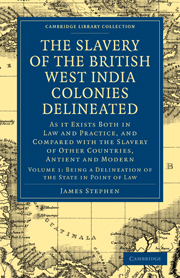 The Slavery of the British West India Colonies Delineated
The Slavery of the British West India Colonies Delineated Book contents
- Frontmatter
- PREFACE
- Contents
- PRELIMINARY CHAPTER: Of the Necessity and Importance of describing the State in question, and the general Plan of the Work
- BOOK I OF THE SLAVERY OF OUR COLONIES CONSIDERED AS A LEGAL INSTITUTION
- Appendix, No. 1
- Appendix, No. II
- Appendix, No. III
- Appendix, No. IV
- Appendix, No. V
PRELIMINARY CHAPTER: Of the Necessity and Importance of describing the State in question, and the general Plan of the Work
Published online by Cambridge University Press: 07 October 2011
- Frontmatter
- PREFACE
- Contents
- PRELIMINARY CHAPTER: Of the Necessity and Importance of describing the State in question, and the general Plan of the Work
- BOOK I OF THE SLAVERY OF OUR COLONIES CONSIDERED AS A LEGAL INSTITUTION
- Appendix, No. 1
- Appendix, No. II
- Appendix, No. III
- Appendix, No. IV
- Appendix, No. V
Summary
To reason first, and define afterwards, is an error which, however absurd, is common in public controversies.
The mind, naturally impatient of analysis, is eager to combine and propagate its ideas—pride also disrelishes enquiry, as a confession of ignorance, and is gratified with the praise of quick and easy discovery: men, therefore, are content with vague names and loose conceptions, even in matters of the highest importance, form judgments upon them with perfect confidence, and, avoiding that troublesome test of knowledge, a definition, rush on to reason before they understand. It is not till after many vain encounters, many falls given and received on the controversial stage, that the disputant finds out his own, or his antagonist's misapprehension, of the terms which they have long bandied in vain; and in order that the combat may have some possible termination, attempts at length to fix by definitions, the true subject of dispute.
How many elaborate contests respecting ideas among the metaphysicians, and respecting faith among theologians, might have been omitted or shortened, had this error been avoided!
But the same misconduct of the reasoning powers is to be found abundantly where definition ought to be more easy, because the subject in general is less abstract, and lies more in the field of ordinary observation; even in disputes concerning civil government, and measures of practical policy.
- Type
- Chapter
- Information
- The Slavery of the British West India Colonies DelineatedAs it Exists Both in Law and Practice, and Compared with the Slavery of Other Countries, Antient and Modern, pp. 1 - 13Publisher: Cambridge University PressPrint publication year: 2010First published in: 1824


